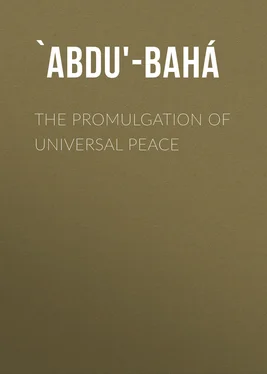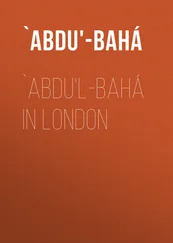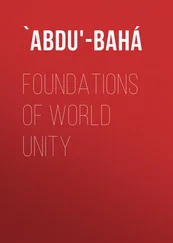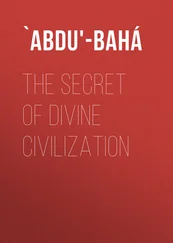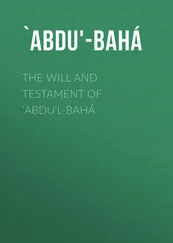`Abdu'-Bahá - The Promulgation of Universal Peace
Здесь есть возможность читать онлайн «`Abdu'-Bahá - The Promulgation of Universal Peace» — ознакомительный отрывок электронной книги совершенно бесплатно, а после прочтения отрывка купить полную версию. В некоторых случаях можно слушать аудио, скачать через торрент в формате fb2 и присутствует краткое содержание. Издательство: Иностранный паблик, Жанр: foreign_prose, foreign_religion, Философия, Ужасы и Мистика, foreign_psychology, на английском языке. Описание произведения, (предисловие) а так же отзывы посетителей доступны на портале библиотеки ЛибКат.
- Название:The Promulgation of Universal Peace
- Автор:
- Издательство:Иностранный паблик
- Жанр:
- Год:неизвестен
- ISBN:нет данных
- Рейтинг книги:4 / 5. Голосов: 1
-
Избранное:Добавить в избранное
- Отзывы:
-
Ваша оценка:
- 80
- 1
- 2
- 3
- 4
- 5
The Promulgation of Universal Peace: краткое содержание, описание и аннотация
Предлагаем к чтению аннотацию, описание, краткое содержание или предисловие (зависит от того, что написал сам автор книги «The Promulgation of Universal Peace»). Если вы не нашли необходимую информацию о книге — напишите в комментариях, мы постараемся отыскать её.
The Promulgation of Universal Peace — читать онлайн ознакомительный отрывок
Ниже представлен текст книги, разбитый по страницам. Система сохранения места последней прочитанной страницы, позволяет с удобством читать онлайн бесплатно книгу «The Promulgation of Universal Peace», без необходимости каждый раз заново искать на чём Вы остановились. Поставьте закладку, и сможете в любой момент перейти на страницу, на которой закончили чтение.
Интервал:
Закладка:
The fifth principle or teaching of Bahá’u’lláh is the abandoning of religious, racial, patriotic and political prejudices, which destroy the foundations of human society. All mankind are creatures and servants of the one God. The surface of the earth is one home; humanity is one family and household. Distinctions and boundaries are artificial, human. Why should there be discord and strife among men? All must become united and coordinated in service to the world of humanity.
The sixth principle or teaching of Bahá’u’lláh concerns the equality of man and woman. He has declared that in the estimation of God there is no distinction of sex. The one whose heart is most pure, whose deeds and service in the Cause of God are greater and nobler, is most acceptable before the divine threshold—whether male or female. In the vegetable and animal kingdoms sex exists in perfect equality and without distinction or invidious estimate. The animal, although inferior to man in intelligence and reason, recognizes sex equality. Why should man, who is endowed with the sense of justice and sensibilities of conscience, be willing that one of the members of the human family should be rated and considered as subordinate? Such differentiation is neither intelligent nor conscientious; therefore, the principle of religion has been revealed by Bahá’u’lláh that woman must be given the privilege of equal education with man and full right to his prerogatives. That is to say, there must be no difference in the education of male and female in order that womankind may develop equal capacity and importance with man in the social and economic equation. Then the world will attain unity and harmony. In past ages humanity has been defective and inefficient because it has been incomplete. War and its ravages have blighted the world; the education of woman will be a mighty step toward its abolition and ending, for she will use her whole influence against war. Woman rears the child and educates the youth to maturity. She will refuse to give her sons for sacrifice upon the field of battle. In truth, she will be the greatest factor in establishing universal peace and international arbitration. Assuredly, woman will abolish warfare among mankind. Inasmuch as human society consists of two parts, the male and female, each the complement of the other, the happiness and stability of humanity cannot be assured unless both are perfected. Therefore, the standard and status of man and woman must become equalized.
Among other teachings and principles Bahá’u’lláh counsels the education of all members of society. No individual should be denied or deprived of intellectual training, although each should receive according to capacity. None must be left in the grades of ignorance, for ignorance is a defect in the human world. All mankind must be given a knowledge of science and philosophy—that is, as much as may be deemed necessary. All cannot be scientists and philosophers, but each should be educated according to his needs and deserts.
Bahá’u’lláh teaches that the world of humanity is in need of the breath of the Holy Spirit, for in spiritual quickening and enlightenment true oneness is attained with God and man. The Most Great Peace cannot be assured through racial force and effort; it cannot be established by patriotic devotion and sacrifice; for nations differ widely and local patriotism has limitations. Furthermore, it is evident that political power and diplomatic ability are not conducive to universal agreement, for the interests of governments are varied and selfish; nor will international harmony and reconciliation be an outcome of human opinions concentrated upon it, for opinions are faulty and intrinsically diverse. Universal peace is an impossibility through human and material agencies; it must be through spiritual power. There is need of a universal impelling force which will establish the oneness of humanity and destroy the foundations of war and strife. None other than the divine power can do this; therefore, it will be accomplished through the breath of the Holy Spirit.
No matter how far the material world advances, it cannot establish the happiness of mankind. Only when material and spiritual civilization are linked and coordinated will happiness be assured. Then material civilization will not contribute its energies to the forces of evil in destroying the oneness of humanity, for in material civilization good and evil advance together and maintain the same pace. For example, consider the material progress of man in the last decade. Schools and colleges, hospitals, philanthropic institutions, scientific academies and temples of philosophy have been founded, but hand in hand with these evidences of development, the invention and production of means and weapons for human destruction have correspondingly increased. In early days the weapon of war was the sword; now it is the magazine rifle. Among the ancients, men fought with javelins and daggers; now they employ shells and bombs. Dreadnoughts are built, torpedoes invented, and every few days new ammunition is forthcoming.
All this is the outcome of material civilization; therefore, although material advancement furthers good purposes in life, at the same time it serves evil ends. The divine civilization is good because it cultivates morals. Consider what the Prophets of God have contributed to human morality. Jesus Christ summoned all to the Most Great Peace through the acquisition of pure morals. If the moral precepts and foundations of divine civilization become united with the material advancement of man, there is no doubt that the happiness of the human world will be attained and that from every direction the glad tidings of peace upon earth will be announced. Then humankind will achieve extraordinary progress, the sphere of human intelligence will be immeasurably enlarged, wonderful inventions will appear, and the spirit of God will reveal itself; all men will consort in joy and fragrance, and eternal life will be conferred upon the children of the Kingdom. Then will the power of the divine make itself effective and the breath of the Holy Spirit penetrate the essence of all things. Therefore, the material and the divine, or merciful, civilizations must progress together until the highest aspirations and desires of humanity shall become realized.
These are a few of the teachings and principles of Bahá’u’lláh, briefly presented so that you may be informed of their significance and purpose and find them a stimulus to your knowledge and actions. I ask God to assist this prosperous and progressive nation and to bestow His blessings upon this just government and wonderful continent of the West.
TALKS ‘ABDU’L-BAHÁ DELIVERED IN NEW YORK, MONTCLAIR, AND JERSEY CITY
11 May 1912
Talk at 227 Riverside Drive, New York
It is only three weeks that we have been away from the New York friends, yet so great has been the longing to see you that it seems like three months. We have had no rest by day or night since we left you—either traveling, moving about or speaking—yet it was all so pleasantly done, and we have been most happy. Praise be to God! Everywhere and all the time it has been harakat, harakat, harakat (“motion, motion, motion”).
The friends in America are very good. All the people we have met here are kind and pleasant. They are polite and not antagonistic, although somewhat inquisitive. A small minority of them seem prejudiced, yet even these have their good points. The American people have a real love for advancement. They are not content to stand still. They are most energetic and progressive. When you see a tree growing and developing, be hopeful of its outcome. It will blossom and bear fruit eventually. If you see dry wood or old trees, there is no hope whatever of fruitage.
Читать дальшеИнтервал:
Закладка:
Похожие книги на «The Promulgation of Universal Peace»
Представляем Вашему вниманию похожие книги на «The Promulgation of Universal Peace» списком для выбора. Мы отобрали схожую по названию и смыслу литературу в надежде предоставить читателям больше вариантов отыскать новые, интересные, ещё непрочитанные произведения.
Обсуждение, отзывы о книге «The Promulgation of Universal Peace» и просто собственные мнения читателей. Оставьте ваши комментарии, напишите, что Вы думаете о произведении, его смысле или главных героях. Укажите что конкретно понравилось, а что нет, и почему Вы так считаете.
